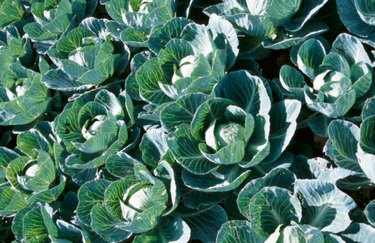
Waste wood ash from a stove or fireplace makes an excellent soil amendment, depending on the local soil quality and the vegetables in the garden. Ash supplies potassium and other trace minerals to plants. It also increases soil pH, making the ground friendlier for plants that require an alkaline environment. However, this soil amendment can cause problems for plants that prefer acid soil, or in areas where the ground already contains high levels of salt.
Alkaline Vegetables
Video of the Day
Members of the Brassica, or cabbage, genus prefer fairly alkaline soils of pH 7 or greater. These include cabbages and cauliflower. Cucumbers also prefer this relatively high pH soil. Asparagus, beets, onions, spinach, okra and mustard all prefer slightly acid soil but will grow in more alkaline conditions. Add wood ashes to soil that doesn't meet these plants' alkalinity requirements.
Video of the Day
Potassium
Many vegetables that prefer alkaline conditions also require significant amounts of potassium, which wood ash provides in slightly lower concentrations than agricultural limestone. The nutrients in wood ash also dissolve better than those in limestone, making them more readily available to the plant. Use wood ash to provide potassium for asparagus, broccoli, celery, leeks, onions, potatoes, tomatoes, pumpkins, greens, squash and leeks.
Acid Soil
Wood ashes work to increase the pH of soils too acid to grow even vegetables that prefer a low pH. These soils are most common in areas with high levels of clay in the soil, especially near coniferous forests. This type of soil is usually also low in organic matter and nutrients, according to Soil Acidity and Liming. Apply wood ash sparingly on celeriac, eggplant, sweet potato, white potato, raspberry and rhubarb plants, all of which prefer pH levels between 5 and 5.8. Use slightly more ash on bean, Brussels sprout, carrot, corn, garlic, pea, pepper, pumpkin, tomato, radish and turnip plants, which prefer pH levels between 5.5 and 6.8.
Warning
Wood ash can cause problems in soils that already have a high pH or where salt buildup is a major concern. Regular use of ashes can make the soil too alkaline to grow any vegetables. It can also encourage sodium and other salts to concentrate in the soil, stunting vegetable growth and damaging roots. Gardeners in dry climates or near salt water should substitute other soil amendments for pH control or to add potassium.
- Oregon State University Extension Service; Wood Ash Can be Useful in Yard if Used with Caution; Carol Savonen, et al.
- “Soil Acidity and Liming”; Best Management Practices for Wood Ash Used as an Agricultural Soil Amendment; Mark Risse, et al.
- Colorado State University Extension; Choosing a Soil Amendment; J.G. Davis, et al.; May 2005
- PlanTea; Acid or Alkaline?; Marion Owen
- The Horticulture and Food Research Institute of New Zealand; Fertiliser Recommendations for Horticultural Crops; R.J. Wood; July 1996
- Cornell Cooperative Extension; Wood Ashes: Use with Care; Charles Howard